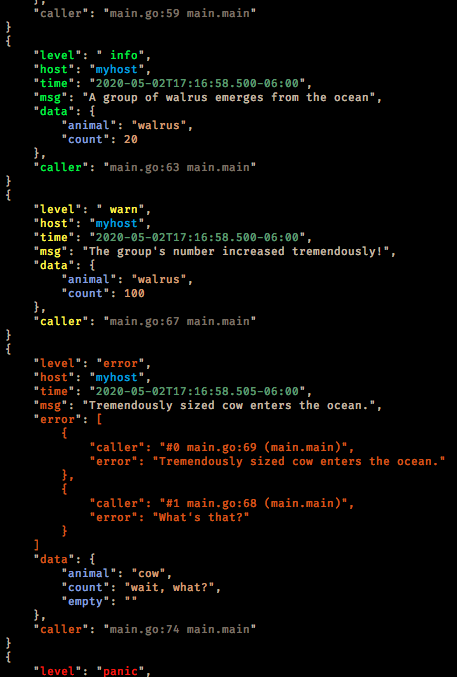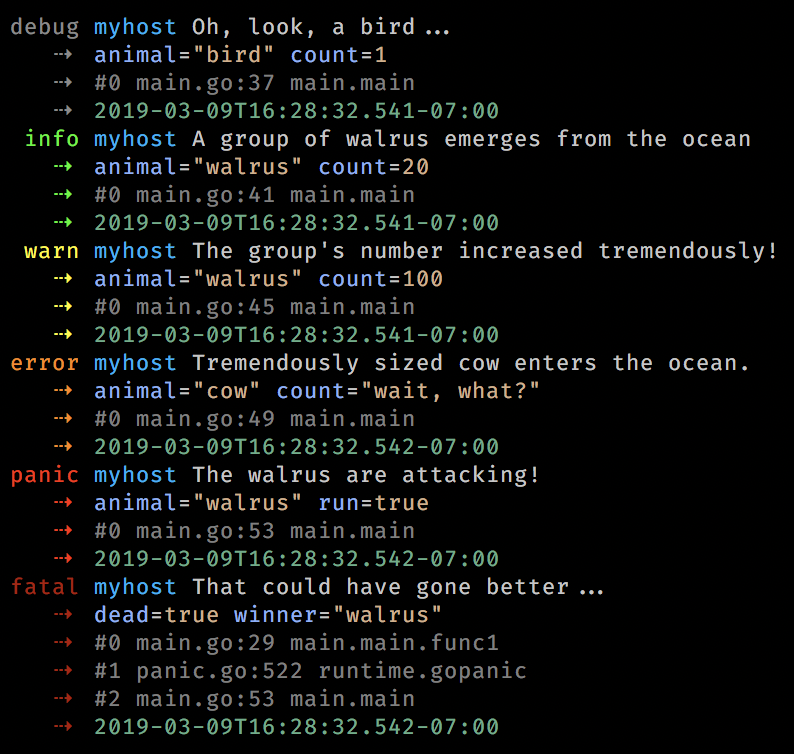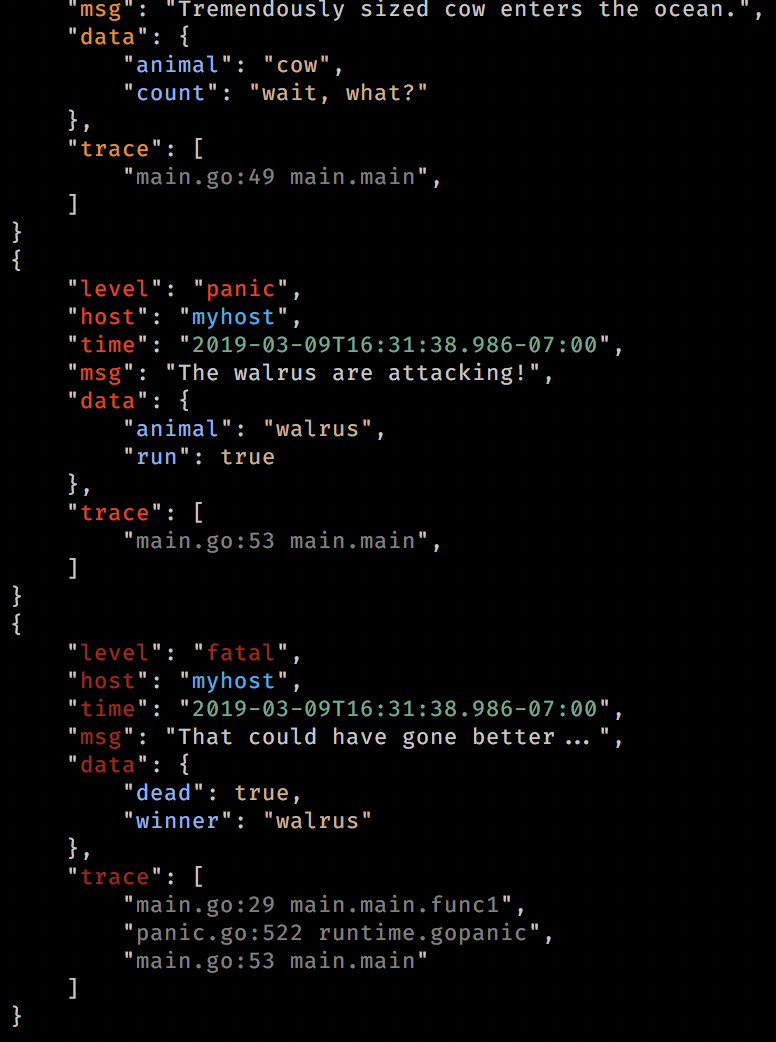# Packages
# README

log
bdlm/log is a fork of the excellent sirupsen/logrus package. This package adds:
- support for sanitizing strings from log output to aid in preventing leaking sensitive data.
- additional default fields
hostandcaller. - verbose output including the full backtrace of logger calls.
- support for suppressing any default field.
- TTY formatting and coloring of JSON output.
- updated formatting for TTY text output.
- updated TTY color scheme.
bdlm/log is a structured logger for Go and is API compatible with the standard libaray log package.
Examples
User documentation
Simple usage
The simplest way to use bdlm/log is with the exported package-level logger:
package main
import (
log "github.com/bdlm/log"
)
func main() {
log.WithFields(log.Fields{
"animal": "walrus",
}).Info("A walrus appears")
}
Compatibility
Note that bdlm/log is fully api-compatible with the stdlib logger, so you can replace your log imports everywhere or using a strangler pattern with "github.com/bdlm/log" and add the full logging flexibility to your service without impacting existing code.
The default log format of this package does not match the stdlib logger's default output so a compatible formatter, StdFormatter, is provided which includes the additional information inline:
log.SetFormatter(&log.StdFormatter{})
Which results in the following log output. StdFormatter does not have a TTY feature:
2018/08/17 20:17:45 Oh, look, a bird... level="debug" data.animal="bird" data.count=1 caller="main.go:39 main.main" host="myhost"
2018/08/17 20:17:45 A group of walrus emerges from the ocean level="info" data.animal="walrus" data.count=20 caller="main.go:43 main.main" host="myhost"
2018/08/17 20:17:45 The group's number increased tremendously! level="warn" data.animal="walrus" data.count=100 caller="main.go:47 main.main" host="myhost"
2018/08/17 20:17:45 Tremendously sized cow enters the ocean. level="error" data.animal="cow" data.count="wait, what?" caller="main.go:51 main.main" host="myhost"
2018/08/17 20:17:45 The walrus are attacking! level="panic" data.animal="walrus" data.run=true caller="main.go:55 main.main" host="myhost"
2018/08/17 20:17:45 That could have gone better... level="fatal" data.dead=true data.winner="walrus" caller="main.go:30 main.main.func1" host="myhost"
Log Formatters
By default, bdlm/log uses a basic text format:
time="2018-08-17T18:28:07.385-06:00" level="debug" msg="Oh, look, a bird..." data.animal="bird" data.count=1 caller="main.go:34 main.main" host="myhost"
time="2018-08-17T18:28:07.385-06:00" level="info" msg="A group of walrus emerges from the ocean" data.animal="walrus" data.count=20 caller="main.go:38 main.main" host="myhost"
time="2018-08-17T18:28:07.385-06:00" level="warn" msg="The group's number increased tremendously!" data.animal="walrus" data.count=100 caller="main.go:42 main.main" host="myhost"
time="2018-08-17T18:28:07.385-06:00" level="error" msg="Tremendously sized cow enters the ocean." data.animal="cow" data.count="wait, what?" caller="main.go:46 main.main" host="myhost"
time="2018-08-17T18:28:07.385-06:00" level="panic" msg="The walrus are attacking!" data.animal="walrus" data.run=true caller="main.go:50 main.main" host="myhost"
time="2018-08-17T18:28:07.385-06:00" level="fatal" msg="That could have gone better..." data.dead=true data.winner="walrus" caller="main.go:25 main.main.func1" host="myhost"
For development, color-coded output formated for humans is automatically enabled when a tty terminal is detected (this can be disabled with log.SetFormatter(&log.TextFormatter{DisableTTY: true})):

JSON formatting is also available with log.SetFormatter(&log.JSONFormatter{}) for easy parsing by logstash or similar:
{"caller":"main.go:36 main.main","data":{"animal":"bird","count":1},"host":"myhost","level":"debug","msg":"Oh, look, a bird...","time":"2018-08-17T18:32:30.786-06:00"}
{"caller":"main.go:40 main.main","data":{"animal":"walrus","count":20},"host":"myhost","level":"info","msg":"A group of walrus emerges from the ocean","time":"2018-08-17T18:32:30.786-06:00"}
{"caller":"main.go:44 main.main","data":{"animal":"walrus","count":100},"host":"myhost","level":"warn","msg":"The group's number increased tremendously!","time":"2018-08-17T18:32:30.786-06:00"}
{"caller":"main.go:48 main.main","data":{"animal":"cow","count":"wait, what?"},"host":"myhost","level":"error","msg":"Tremendously sized cow enters the ocean.","time":"2018-08-17T18:32:30.786-06:00"}
{"caller":"main.go:52 main.main","data":{"animal":"walrus","run":true},"host":"myhost","level":"panic","msg":"The walrus are attacking!","time":"2018-08-17T18:32:30.786-06:00"}
{"caller":"main.go:27 main.main.func1","data":{"dead":true,"winner":"walrus"},"host":"myhost","level":"fatal","msg":"That could have gone better...","time":"2018-08-17T18:32:30.787-06:00"}
The JSON formatter also makes adjustments by default when a tty terminal is detected and can be disabled similarly with log.SetFormatter(&log.JSONFormatter{DisableTTY: true}):

Backtrace data
The standard formatters also have a trace mode that is disabled by default. Rather than acting as an additional log level, it is instead a verbose mode that includes the full backtrace of the call that triggered the log write. To enable trace output, set EnableTrace to true.
Here are the above examples with trace enabled:
TextFormat
Non-TTY trace output:
log.SetFormatter(&log.TextFormatter{
DisableTTY: true,
EnableTrace: true,
})
time="2018-08-18T00:20:36.468-06:00" level="debug" msg="Oh, look, a bird..." data.animal="bird" data.count=1 host="myhost" trace.0="main.go:38 main.main"
time="2018-08-18T00:20:36.469-06:00" level="info" msg="A group of walrus emerges from the ocean" data.animal="walrus" data.count=20 host="myhost" trace.0="main.go:42 main.main"
time="2018-08-18T00:20:36.469-06:00" level="warn" msg="The group's number increased tremendously!" data.animal="walrus" data.count=100 host="myhost" trace.0="main.go:46 main.main"
time="2018-08-18T00:20:36.469-06:00" level="error" msg="Tremendously sized cow enters the ocean." data.animal="cow" data.count="wait, what?" host="myhost" trace.0="main.go:50 main.main"
time="2018-08-18T00:20:36.469-06:00" level="panic" msg="The walrus are attacking!" data.animal="walrus" data.run=true host="myhost" trace.0="main.go:54 main.main"
time="2018-08-18T00:20:36.469-06:00" level="fatal" msg="That could have gone better..." data.dead=true data.winner="walrus" host="myhost" trace.0="main.go:30 main.main.func1" trace.1="asm_amd64.s:573 runtime.call32" trace.2="panic.go:502 runtime.gopanic" trace.3="main.go:54 main.main"
TTY trace output:
log.SetFormatter(&log.TextFormatter{
EnableTrace: true,
ForceTTY: true,
})

JSONFormat
To enable trace output:
log.SetFormatter(&log.JSONFormatter{
DisableTTY: true,
EnableTrace: true,
})
Non-TTY trace output:
{"caller":"main.go:38 main.main","data":{"animal":"bird","count":1},"host":"myhost","level":"debug","msg":"Oh, look, a bird...","time":"2018-08-18T00:22:16.057-06:00","trace":["main.go:38 main.main"]}
{"caller":"main.go:42 main.main","data":{"animal":"walrus","count":20},"host":"myhost","level":"info","msg":"A group of walrus emerges from the ocean","time":"2018-08-18T00:22:16.058-06:00","trace":["main.go:42 main.main"]}
{"caller":"main.go:46 main.main","data":{"animal":"walrus","count":100},"host":"myhost","level":"warn","msg":"The group's number increased tremendously!","time":"2018-08-18T00:22:16.058-06:00","trace":["main.go:46 main.main"]}
{"caller":"main.go:50 main.main","data":{"animal":"cow","count":"wait, what?"},"host":"myhost","level":"error","msg":"Tremendously sized cow enters the ocean.","time":"2018-08-18T00:22:16.058-06:00","trace":["main.go:50 main.main"]}
{"caller":"main.go:54 main.main","data":{"animal":"walrus","run":true},"host":"myhost","level":"panic","msg":"The walrus are attacking!","time":"2018-08-18T00:22:16.058-06:00","trace":["main.go:54 main.main"]}
{"caller":"main.go:30 main.main.func1","data":{"dead":true,"winner":"walrus"},"host":"myhost","level":"fatal","msg":"That could have gone better...","time":"2018-08-18T00:22:16.058-06:00","trace":["main.go:30 main.main.func1","asm_amd64.s:573 runtime.call32","panic.go:502 runtime.gopanic","main.go:54 main.main"]}
TTY trace output:
log.SetFormatter(&log.JSONFormatter{
EnableTrace: true,
ForceTTY: true,
})





